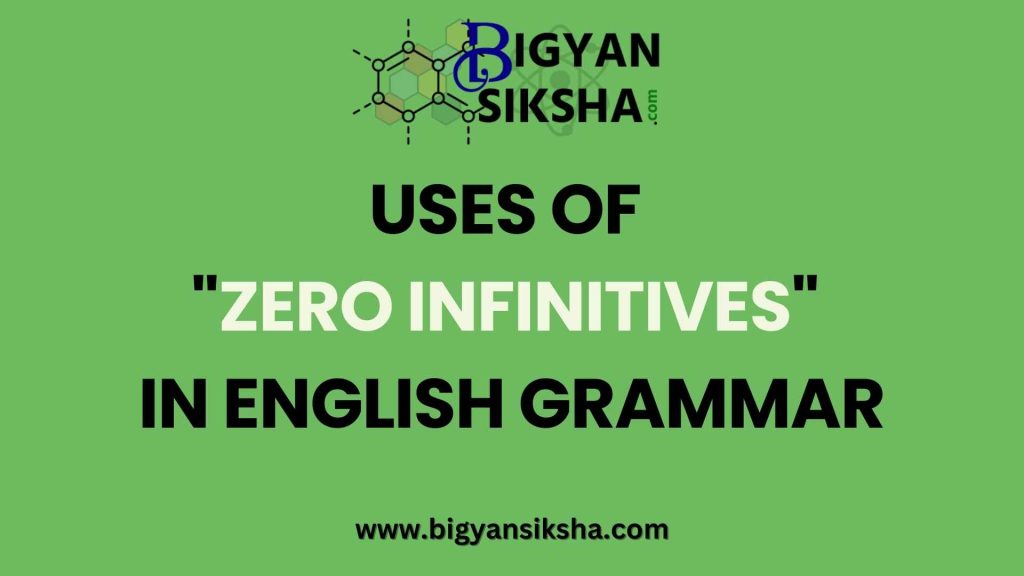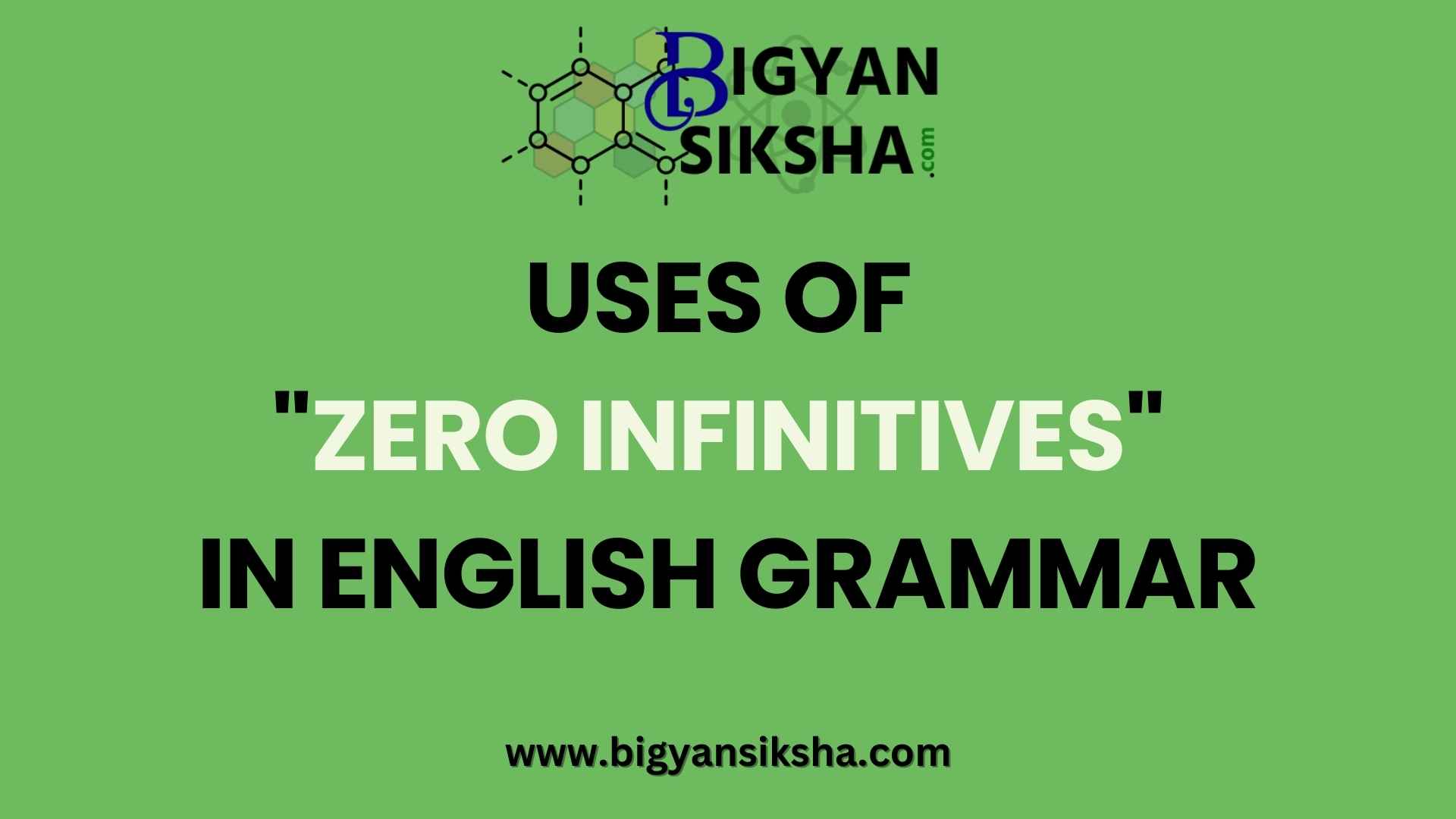
5 Key Uses of Zero Infinitives: A Quick Guide
USES OF “ZERO INFINITIVES” IN ENGLISH GRAMMAR
Infinitives are non-finite verbs such as NOUN, ADJECTIVE or ADVERB.
Types of infinitives :
(1) FULL INFINITIVES —– used with infinitive marker “to”
(2) ZERO INFINITIVES or BARE INFINITIVES —— used without infinitive marker “to”.
Bare or zero infinitives are formed without a marker “to”, and you simply use the base form of a verb within a sentence.
Uses of zero / bare infinitives in a sentence :
Unlock the Power of Zero Infinitives: Improve Your English Grammar
(1) AFTER MODAL VERBS :
We use a bare infinitive almost after every modal verb like can, may, might, dare, ought, could, should, would, will and must.
Eg.
■ He can do this all day.
[ Zero infinitive = do]
■ We might be late tonight.
[ Zero infinitive = be ]
■ We should love the children.
[ Zero infinitive = love ]
5 Key Uses of Zero Infinitives: A Quick Guide
(2) AFTER PERCEPTION VERBS :
Perception verbs (see, hear, taste, feel, etc) use zero infinitives when their object takes an action.
In this case, the syntactic order is
Main verb –> Direct object —> Zero infinitive.
Eg.
■ I heard the car arrive before I saw it.
[ Main verb = heard
The object of the main verb = the car
Zero infinitive = arrive ]
■ He felt the ants crawl on his arms.
[ Main verb = felt
An object of the main verb = the ants
Zero infinitive = crawl ]
■ She watched the woman in the red dress walk across the dance floor.
[ Main verb = watched
An object of the main verb = the woman in the red dress
Zero infinitive = walk ]
(3) WITH THE CAUSATIVE VERBS “LET” AND “MAKE” :
The syntactic order is
Let / Make —> Direct object —> Zero infinitive
Eg.
■ Let me do the job.
[ Causative verb = Let
An object of causative verb = me
Zero infinitive = do ]
■ He made me go home at once.
(4) WITH THE PRIMARY AUXILIARY VERB “DO” :
A zero infinitive is used with a primary auxiliary usually expressed in its negative form (with the adverb of negation “not”) in an assertive sentence.
Eg.
■ I don’t drink coffee in the evening.
[ Zero infinitive = drink ]
■ They didn’t have any problems with us.
[ Zero infinitive = have ]
Mastering the Art of Zero Infinitives: A Comprehensive Guide
(5) WITH THE RELATIVE PRONOUN “WHY” :
While the other relative pronouns use the full infinitive form, the word “why” uses the zero infinitive especially when used to make suggestions in the form of a question.
Eg.
■ Why wear a raincoat when it’s sunny outside?
[ Zero infinitive = wear ]
■ Why not ask for directions?
■ Why bother?
By Somranjan Pal
🅵🅰🆀
Q.1: What are zero infinitives?
Ans: Zero infinitives, also known as bare infinitives, are the base form of a verb used without the infinitive marker “to.” For example, in the sentence, “He can do this all day,” the verb “do” is a zero infinitive.
Q.2: What are the main types of infinitives?
Ans: There are two main types of infinitives:
Full Infinitives – Used with the marker “to” (e.g., to eat, to go).
Zero or Bare Infinitives – Used without the marker “to” (e.g., eat, go).
Q.3: When should we use zero infinitives after modal verbs?
Ans: Zero infinitives are used after modal verbs such as can, may, might, dare, ought, could, should, would, will, and must. For example, in “We might be late tonight,” the verb “be” is a zero infinitive.
Q.4: How are zero infinitives used with perception verbs?
Ans: With perception verbs (e.g., see, hear, feel, watch), zero infinitives follow the verb’s direct object when describing an observed action. For example, in “I heard the car arrive,” “arrive” is the zero infinitive.
Q.5: What are causative verbs, and how do they use zero infinitives?
Ans: Causative verbs like “let” and “make” require zero infinitives following a direct object. For example, in “Let me do the job,” “do” is the zero infinitive.
Q.6: Are zero infinitives used with the auxiliary verb “do”?
Ans: Yes, zero infinitives follow the auxiliary verb “do,” especially in negative statements. For example, in “I don’t drink coffee,” “drink” is the zero infinitive.
Q.7: How does the relative pronoun “why” use zero infinitives?
Ans: The pronoun “why” uses zero infinitives when making question suggestions. For example, in “Why wear a raincoat?” the verb “wear” is a zero infinitive.
READ MORE
MANY MODERN LINGUISTS HAVE CHANGED THE TRADITIONAL CONCEPT OF A SIMPLE SENTENCE

READ MORE
10 Easy Ways to Use Attributive Nouns in English Grammar

READ MORE
A COMPLETE CLASSIFICATION OF THE NON-FINITE SUBORDINATE CLAUSES IN ENGLISH GRAMMAR

READ MORE
3 Common Mistakes to Avoid When Using Inverted Syntax

READ MORE
Master Cleft Sentences: A Simple Guide to Improve Your English Grammar

- 5.1 ভারত: অবস্থান ও প্রশাসনিক বিভাগ | Class 10 Geography Short Question and Answer 2025
 5.1 ভারত: অবস্থান ও প্রশাসনিক বিভাগ (ভারত – পঞ্চম অধ্যায়) থেকে বহুবিকল্পভিত্তিক, সংক্ষিপ্ত, অতিসংক্ষিপ্ত এবং রচনাধর্মী প্রশ্ন উত্তর (MCQ, Very Short, Short, Descriptive Question and Answer) গুলি আগামী West Bengal Class 10th Madhyamik Geography Examination – পশ্চিমবঙ্গ মাধ্যমিক ভূগোল পরীক্ষার জন্য খুব ইম্পর্টেন্ট তোমরা যারা মাধ্যমিক ভূগোল পরীক্ষার জন্য 5.1 ভারত: অবস্থান ও প্রশাসনিক বিভাগ (ভারত – পঞ্চম অধ্যায়) MCQ প্রশ্ন ও …
5.1 ভারত: অবস্থান ও প্রশাসনিক বিভাগ (ভারত – পঞ্চম অধ্যায়) থেকে বহুবিকল্পভিত্তিক, সংক্ষিপ্ত, অতিসংক্ষিপ্ত এবং রচনাধর্মী প্রশ্ন উত্তর (MCQ, Very Short, Short, Descriptive Question and Answer) গুলি আগামী West Bengal Class 10th Madhyamik Geography Examination – পশ্চিমবঙ্গ মাধ্যমিক ভূগোল পরীক্ষার জন্য খুব ইম্পর্টেন্ট তোমরা যারা মাধ্যমিক ভূগোল পরীক্ষার জন্য 5.1 ভারত: অবস্থান ও প্রশাসনিক বিভাগ (ভারত – পঞ্চম অধ্যায়) MCQ প্রশ্ন ও … - চক্রপাণি দত্ত: কিংবদন্তী চিকিৎসক ও পণ্ডিত
 চক্রপাণি দত্ত ছিলেন বিখ্যাত একজন আদর্শ চিকিৎসক এবং শারীরতত্ত্ববিদ। বহু দূর থেকে রোগীরা তাঁর কাছে চিকিৎসার জন্য আসতেন। তিনি রোগীদের চিকিৎসা করতেন আনন্দ সহকারে এবং অবসর সময়ে বই লিখতেন। তাঁর রচিত গ্রন্থগুলির মধ্যে ‘চিকিৎসা সংগ্রহ‘, ‘দ্রব্য গুণ‘ এবং ‘সর্বসার সংগ্রহ‘ উল্লেখযোগ্য। ‘চক্রদত্ত‘ নামক গ্রন্থে তিনি চিকিৎসা সংক্রান্ত বিষয় লিপিবদ্ধ করেছেন। টীকাকার ও উপাধি চক্রপাণি দত্ত …
চক্রপাণি দত্ত ছিলেন বিখ্যাত একজন আদর্শ চিকিৎসক এবং শারীরতত্ত্ববিদ। বহু দূর থেকে রোগীরা তাঁর কাছে চিকিৎসার জন্য আসতেন। তিনি রোগীদের চিকিৎসা করতেন আনন্দ সহকারে এবং অবসর সময়ে বই লিখতেন। তাঁর রচিত গ্রন্থগুলির মধ্যে ‘চিকিৎসা সংগ্রহ‘, ‘দ্রব্য গুণ‘ এবং ‘সর্বসার সংগ্রহ‘ উল্লেখযোগ্য। ‘চক্রদত্ত‘ নামক গ্রন্থে তিনি চিকিৎসা সংক্রান্ত বিষয় লিপিবদ্ধ করেছেন। টীকাকার ও উপাধি চক্রপাণি দত্ত … - পশ্চিমবঙ্গ সরকারের EWS সার্টিফিকেট পাওয়ার পদ্ধতি | EWS Certificate West Bengal Criteria | EWS সার্টিফিকেট কি এবং কেন এটি গুরুত্বপূর্ণ?
 EWS সম্পূর্ণ কথাটি হল ইকনোমিক্যালি উই কার সেকশন (Economically Weaker Section) বা সমাজের অর্থনৈতিকভাবে দুর্বল শ্রেণি। EWS সার্টিফিকেটের মূল উদ্দেশ্য হলো সমাজের অর্থনৈতিকভাবে পিছিয়ে পড়া অংশকে নির্দিষ্ট কিছু সরকারি সুযোগ সুবিধা দেওয়া।এই সার্টিফিকেট এর মাধ্যমে দেশের বিভিন্ন শিক্ষা প্রতিষ্ঠান এবং সরকারি চাকরিতে 10% সংরক্ষণ পাওয়া যেতে পারে। শুধুমাত্র জেনারেল কাস্ট যারা অন্য কোন সংরক্ষণের অন্তর্ভুক্ত …
EWS সম্পূর্ণ কথাটি হল ইকনোমিক্যালি উই কার সেকশন (Economically Weaker Section) বা সমাজের অর্থনৈতিকভাবে দুর্বল শ্রেণি। EWS সার্টিফিকেটের মূল উদ্দেশ্য হলো সমাজের অর্থনৈতিকভাবে পিছিয়ে পড়া অংশকে নির্দিষ্ট কিছু সরকারি সুযোগ সুবিধা দেওয়া।এই সার্টিফিকেট এর মাধ্যমে দেশের বিভিন্ন শিক্ষা প্রতিষ্ঠান এবং সরকারি চাকরিতে 10% সংরক্ষণ পাওয়া যেতে পারে। শুধুমাত্র জেনারেল কাস্ট যারা অন্য কোন সংরক্ষণের অন্তর্ভুক্ত … - ধাতুবিদ্যা দশম শ্রেণী – প্রশ্ন উত্তর | WBBSE Class 10th Physical Science Suggestion ভৌত বিজ্ঞান দশম শ্রেণী
 দশম শ্রেণী ভৌত বিজ্ঞান সাজেশন – WBBSE Class 10th Physical Science Suggestion – ধাতুবিদ্যা দশম শ্রেণী Chapter 8.5 – প্রশ্ন উত্তর নিচে দেওয়া হল । এই WBBSE Class 10th (X) Madhyamik Physical Science Suggestion – মাধ্যমিক দশম শ্রেণীর ভৌত বিজ্ঞান সাজেশন – ধাতুবিদ্যা দশম শ্রেণী – প্রশ্ন উত্তর গুলি আগামী 2026 সালের পশ্চিমবঙ্গ মাধ্যমিক ভৌত বিজ্ঞান …
দশম শ্রেণী ভৌত বিজ্ঞান সাজেশন – WBBSE Class 10th Physical Science Suggestion – ধাতুবিদ্যা দশম শ্রেণী Chapter 8.5 – প্রশ্ন উত্তর নিচে দেওয়া হল । এই WBBSE Class 10th (X) Madhyamik Physical Science Suggestion – মাধ্যমিক দশম শ্রেণীর ভৌত বিজ্ঞান সাজেশন – ধাতুবিদ্যা দশম শ্রেণী – প্রশ্ন উত্তর গুলি আগামী 2026 সালের পশ্চিমবঙ্গ মাধ্যমিক ভৌত বিজ্ঞান … - তড়িৎ প্রবাহ ও রাসায়নিক বিক্রিয়া – প্রশ্ন উত্তর | WBBSE Class 10th Physical Science Suggestion ভৌত বিজ্ঞান দশম শ্রেণী
 দশম শ্রেণী ভৌত বিজ্ঞান সাজেশন – WBBSE Class 10th Physical Science Suggestion – তড়িৎ প্রবাহ ও রাসায়নিক বিক্রিয়া Chapter 8.3 – প্রশ্ন উত্তর নিচে দেওয়া হল । এই WBBSE Class 10th (X) Madhyamik Physical Science Suggestion – মাধ্যমিক দশম শ্রেণীর ভৌত বিজ্ঞান সাজেশন – তড়িৎ প্রবাহ ও রাসায়নিক বিক্রিয়া – প্রশ্ন উত্তর গুলি আগামী সালের পশ্চিমবঙ্গ …
দশম শ্রেণী ভৌত বিজ্ঞান সাজেশন – WBBSE Class 10th Physical Science Suggestion – তড়িৎ প্রবাহ ও রাসায়নিক বিক্রিয়া Chapter 8.3 – প্রশ্ন উত্তর নিচে দেওয়া হল । এই WBBSE Class 10th (X) Madhyamik Physical Science Suggestion – মাধ্যমিক দশম শ্রেণীর ভৌত বিজ্ঞান সাজেশন – তড়িৎ প্রবাহ ও রাসায়নিক বিক্রিয়া – প্রশ্ন উত্তর গুলি আগামী সালের পশ্চিমবঙ্গ … - মাধ্যমিক জীবন বিজ্ঞান – জীবনের প্রবাহমানতা (দ্বিতীয় অধ্যায়) প্রশ্ন ও উত্তর | Madhyamik Life Science Question and Answer
 মাধ্যমিক জীবন বিজ্ঞান প্রশ্ন ও উত্তর : জীবনের প্রবাহমানতা (দ্বিতীয় অধ্যায়) Madhyamik Life Science Question and Answer : মাধ্যমিক জীবন বিজ্ঞান – জীবনের প্রবাহমানতা (দ্বিতীয় অধ্যায়) প্রশ্ন ও উত্তর | Madhyamik Life Science Question and Answer, দশম শ্রেণীর জীবন বিজ্ঞান দ্বিতীয় অধ্যায় এর প্রশ্ন উত্তর pdf নিচে দেওয়া হলো MCQ প্রশ্নোত্তর | মাধ্যমিক জীবন বিজ্ঞান – …
মাধ্যমিক জীবন বিজ্ঞান প্রশ্ন ও উত্তর : জীবনের প্রবাহমানতা (দ্বিতীয় অধ্যায়) Madhyamik Life Science Question and Answer : মাধ্যমিক জীবন বিজ্ঞান – জীবনের প্রবাহমানতা (দ্বিতীয় অধ্যায়) প্রশ্ন ও উত্তর | Madhyamik Life Science Question and Answer, দশম শ্রেণীর জীবন বিজ্ঞান দ্বিতীয় অধ্যায় এর প্রশ্ন উত্তর pdf নিচে দেওয়া হলো MCQ প্রশ্নোত্তর | মাধ্যমিক জীবন বিজ্ঞান – …
